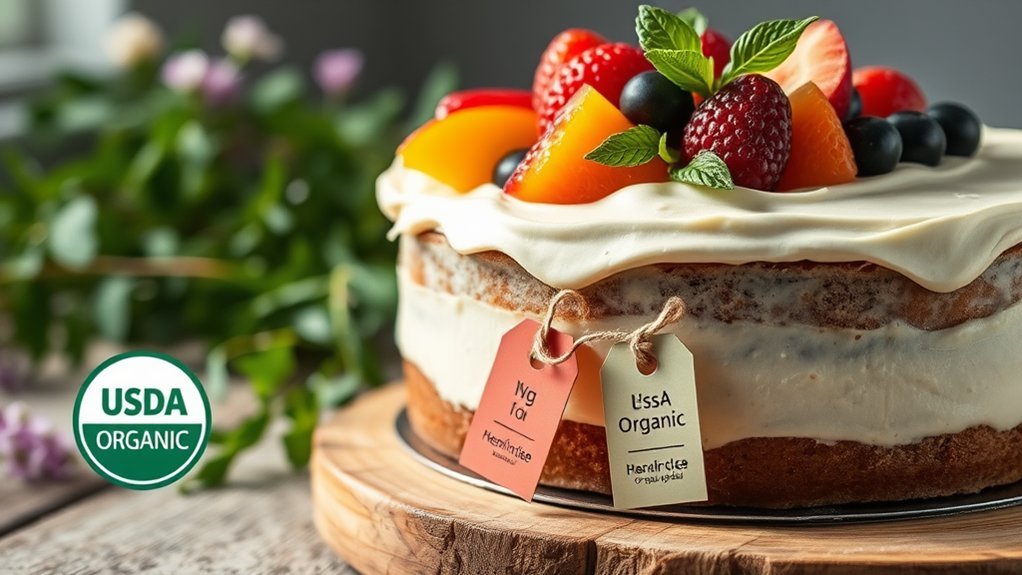How to Identify a Certified Organic Cake
To identify a certified organic cake, look for the Soil Association logo, which indicates compliance with rigorous standards. Check for labels stating "100% organic" or "organic," ensuring they contain at least 95% organic ingredients. Review the ingredients list to confirm authenticity—only certain non-organic components are permitted. It's also wise to research the producer's credibility and be wary of misleading claims. Understanding these aspects will help you make informed choices about organic cakes in the UK.
Key Takeaways
- Look for the Soil Association logo or the USDA Organic Seal, which indicate adherence to strict organic standards.
- Check that the ingredient list contains at least 95% organic ingredients to confirm the cake's organic certification.
- Ensure all ingredients are sourced from certified organic farms and are free from artificial additives.
- Research the producer's certifications and reputation to confirm their commitment to organic methods.
- Be cautious of exaggerated eco-friendly claims; always verify certifications to avoid misleading products.
Understanding Organic Certification Standards

When looking for a certified organic cake, it's important to grasp the organic certification standards that dictate its production. These standards stem from the history of organic farming, which prioritises sustainable practices. Organic operations are required to improve soil and water quality, banning synthetic fertilisers and pesticides. Instead, they utilise regulated manure and keep detailed records through an Organic Systems Plan. Additionally, all organic products must be USDA certified to ensure compliance with these standards.
For a product to be labelled "organic," it must contain at least 95% organic ingredients, while "100% Organic" means it's made entirely from organic components. The certification process includes thorough applications, annual inspections, and strict adherence to guidelines, which also require a three-year transition period for conventional farms. Understanding these standards will help you confidently select a genuine organic cake.
Recognizing the USDA Organic Seal

When looking for a certified organic cake, it's important to recognise the USDA Organic Seal. This seal indicates that the product meets strict USDA organic standards and has been certified by approved agents. Familiarising yourself with its design and display can help you make better choices when shopping. For instance, if you see this seal on a cake, you can trust that it contains organic ingredients that have been farmed without synthetic pesticides or fertilisers. Additionally, the certification process ensures that every product bearing the seal has undergone rigorous evaluations to maintain compliance with organic standards.
Understanding Organic Labels
Understanding organic labels is crucial for recognising the authenticity of a certified organic cake. The Soil Association logo is a reliable indicator of compliance with UK organic standards. Knowing the different organic labels can help you determine what's genuinely organic.
For example, a product marked "100% organic" must contain all organic ingredients, while "organic" indicates at least 95% organic content. The label "made with organic" can include a minimum of 70% organic ingredients but can't display the Soil Association logo. Additionally, products labeled as "organic" require at least 95% organic ingredients to meet certification standards.
It's important to understand the certification process, as certified products undergo strict evaluation by accredited bodies to ensure they meet organic standards. This knowledge helps you make informed choices when selecting organic cakes.
Importance of Certification
Recognising the USDA Organic Seal is crucial for consumers looking for genuine organic cakes. This seal confirms that the product meets strict organic farming standards established by the National Organic Program (NOP). The certification process involves annual inspections by accredited agents to ensure compliance with these regulations.
By choosing cakes with this seal, you can be confident that they're free from GMOs, antibiotics, and artificial additives.
Moreover, the USDA Organic Seal reflects a commitment to sustainable practices, supporting environmental health. It acts as a safeguard against misleading claims, giving you peace of mind that what you're buying genuinely meets organic standards.
Ultimately, the seal not only protects your choices but also encourages a market that values authenticity in organic products.
Labeling Categories for Organic Cakes

To identify a certified organic cake, it's important to understand the different labels that signify organic products.
Cakes labelled "100% organic" contain solely organic agricultural ingredients. Those marked "organic" must consist of at least 95% organic ingredients. If a cake is labelled "made with organic ingredients," it means at least 70% of the ingredients are organic.
Each label should also include the name of the certifying agent and meet strict guidelines. The presence of the USDA Organic Seal indicates that these standards have been met.
Knowing these categories helps you ensure that the cake you choose contains the organic ingredients you desire, offering transparency and confidence in your purchase.
Evaluating Ingredient Lists for Organic Compliance

When checking an ingredient list for organic compliance, focus on the percentage of organic ingredients in the cake.
Look for certification labels from UK-approved bodies, as these confirm that the ingredients meet organic standards.
These steps are crucial for ensuring the cake's organic authenticity.
Check Ingredient Percentages
Checking ingredient percentages is crucial for ensuring a cake meets organic certification standards. To evaluate compliance, calculate the organic content by dividing the weight of organic ingredients by the total weight of all ingredients, excluding water and salt.
Only specific non-organic ingredients from the National List are allowed. A cake labelled as "Organic" must contain at least 95% organic agricultural ingredients, while "Made with Organic" requires a minimum of 70%.
For proper verification, ensure you have documentation from suppliers, such as certificates confirming the organic status of the ingredients. By thoroughly checking these percentages, you help maintain integrity and ensure the cake meets UK organic certification guidelines.
Look for Certification Labels
When evaluating a cake's organic credentials, look for valid certification labels to confirm its compliance with organic standards. Recognised organisations such as the Soil Association, EU Organic, and Ecocert provide certification for cakes, ensuring they meet strict organic requirements.
The Soil Association logo, commonly seen in the UK, indicates that the cake contains at least 95% organic ingredients. Make sure the label includes the name of the certifying body and lists only natural ingredients—no synthetic chemicals or GMOs.
Labels like "100% Organic" guarantee fully certified organic content, while "Made with Organic" confirms a minimum of 70% organic ingredients. This transparency is vital for verifying the authenticity of organic claims in cakes.
Importance of USDA Accreditation

Understanding the significance of USDA accreditation is crucial for anyone keen to ensure the integrity of organic products.
This certification not only guarantees compliance with rigorous organic farming standards but also provides several key benefits:
- Credibility: Certifying agents confirm that farms meet USDA regulations, fostering consumer trust.
- Market Advantage: USDA-certified products typically fetch higher prices, giving producers a competitive edge.
- Global Recognition: USDA accreditation is acknowledged worldwide, broadening market opportunities.
Common Misleading Claims to Avoid

When shopping for a certified organic cake, it's important to recognise common misleading claims that can obscure the truth about the ingredients. Labels like "All Natural" might suggest that a product is fully organic, but this can hide synthetic additives.
Be wary of brands that claim organic status without proper USDA approval; these false certifications can mislead you.
Also, ingredient lists that lack transparency can leave you guessing about what's genuinely organic. Exaggerated eco-friendly claims are another red flag, as they often don't provide evidence to back them up.
Always check the labels and verify certifications to avoid being deceived. By staying informed, you can make choices that truly reflect your commitment to organic products.
Researching Organic Producers and Suppliers

How can you be sure the organic cake you choose meets your standards? Researching local organic producers and suppliers is vital.
Start by checking their certifications from recognised bodies to confirm they comply with organic standards. Here are some key factors to consider:
- Ingredient Source: Ensure all ingredients are sourced from certified organic farms.
- Production Techniques: Look for traditional methods that prioritise quality and sustainability.
- Supplier Relationships: Build long-term partnerships with reliable suppliers for consistent quality.
Frequently Asked Questions
Can I Make My Own Organic Cake at Home?
Yes, you can make your own organic cake at home. By using homemade recipes and high-quality organic ingredients like flour, sugar, and eggs, you'll create a tasty treat while promoting healthier eating habits. For example, try using organic wholemeal flour for a nuttier flavour or organic cane sugar for a less processed option.
Are There Specific Brands Known for Organic Cakes?
When searching for organic cake brands, consider Miss Jones Baking Co. and Annie's Homegrown. They provide a range of organic cake options that prioritise both quality and taste, ensuring you enjoy a delicious treat without compromising your health.
How Much More Expensive Are Organic Cakes Compared to Conventional Ones?
When looking at the price of organic cakes, you'll generally find they are 20-50% more expensive than conventional cakes. This difference in cost is due to the use of higher-quality ingredients, increased labour, and certification fees. For example, if a standard cake costs £10, an organic version could set you back £12 to £15. This price point appeals to those who prefer healthier options.
Are Organic Cakes Suitable for People With Allergies?
Organic cakes may not always be suitable for those with allergies, as they can still include common allergens. Even if gluten-free alternatives are used, it's crucial to check for cross-contamination and specific allergen warnings before indulging. For example, a cake made with almond flour might not be safe for someone with a nut allergy. Always read labels carefully to ensure safety.
How Long Do Organic Cakes Typically Last?
Organic cakes typically last between three to five days if stored correctly. For the best results, keep them in airtight containers at room temperature. If your cake contains dairy, it's best to refrigerate it to ensure freshness.
Conclusion
To identify a certified organic cake, it's essential to pay attention to details and understand organic standards. In 2021, sales of organic food in the UK rose significantly, highlighting consumer interest in healthier options. Look for the Soil Association Organic logo, check ingredient lists for organic certifications, and be cautious of misleading labels. By making informed choices, you not only support your health but also promote sustainable food production practices.







